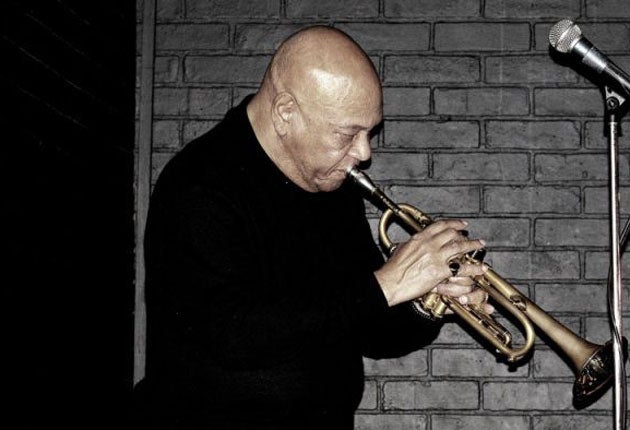Harry Beckett: Highly respected trumpeter who worked with Mingus, Scott, Dankworth and Tracey

One of the most eloquent and inventive of our jazz players, the trumpeter and flugelhorn player Harry Beckett didn't get the recognition he deserved. Because he was a quiet and gentle person, he remained a sideman and not primarily a bandleader. He was unique in that his lyrical and romantic style allowed him to play adventurous and even free-form jazz and still to communicate lucidly with his audience. He was also at home with reggae and electronic jazz.
Many of the younger black musicians who grew up in London regarded Beckett as a father figure. However, maybe he should have been thought of as a grandfather figure. According to the books he was 74 when he died, but his wife Veronica told me differently. "He was really 86, but he always knocked the years off," she said. "He told me it was because he thought if they knew his age nobody would want to hire him because he was too old." Beckett occasionally had difficulty when asked to show his passport because the date of birth on it had been defaced.
Born in Barbados, where he learned music in a Salvation Army band, Beckett came to England in 1954 and gradually worked his way into the London jazz scene. During the 1960s four of our finest jazz composers – Mike Gibbs, Neil Ardley, Mike Westbrook and Graham Collier – pounced upon him for their orchestras. He also played in the London Composers' Orchestra and the New Jazz Orchestra. In 1961, when the American bassist Charlie Mingus was in London working on the film All Night Long, he admired Beckett's playing and chose him for the small jazz group in the film. That year Beckett joined Collier's group and stayed with it until 1977. He had potent musical associations with guitarist Ray Russell and alto player Mike Osborne.
His beautiful playing made him so much in demand that, apart from plenty of work in the studios, he appeared in almost all the finest modern groups, including those of John Surman, John Warren, Barbara Thompson, Elton Dean, Kathy Stobart, Dudu Pukwana, Chris McGregor's Brotherhood of Breath and Ian Carr's Nucleus. He was a member of Ronnie Scott's Quintet and Johnny Dankworth's big band. Always in demand on the continent, he played as a member of Pierre Dørge's Ellington-inspired New Jungle Orchestra and George Gruntz's big band.
In 1972 Beckett won the Trumpeter of the Year award in the Melody Maker poll. From 1974, his main job was in Stan Tracey's Octet, where he stayed until the 1980s, when he led his own bands and toured briefly in the Middle East with one of them. He also toured in India, and in Europe with Dudu Pukwana's Zila during 1985. From 1986-1991 he was an important part of the all-black Jazz Warriors. He played in Louis Moholo's Dedication Orchestra in 2003. At this period he began appearing in jazz workshops and ever afterwards was keen to work in jazz education. Although he mostly graced the recordings of others, he made several inspired albums under his own name; the last of them, in 2008, was the dub-oriented The Modern Sound of Harry Beckett.
Harold Winston Beckett, jazz musician: born St Michael Parish, Barbados 30 May 1923; married 1956 Veronica Babb (four sons, two daughters); died London 22 July 2010.
Join our commenting forum
Join thought-provoking conversations, follow other Independent readers and see their replies
Comments
Bookmark popover
Removed from bookmarks